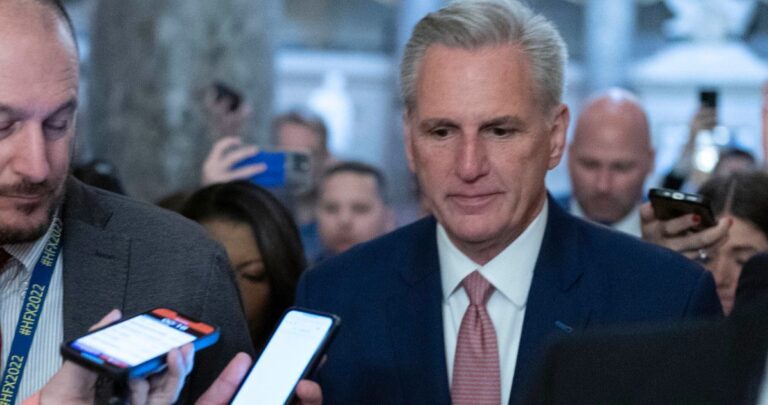
[ad_1]

A bill to cut federal spending by more than a $1 trillion and raise the debt ceiling through the 2024 presidential election was set for a House vote Wednesday, only days ahead of a possible first-ever government debt default.
While hard-line Republican lawmakers threatened to try to tank the bill Tuesday, party leaders expressed optimism there would be enough votes, from both parties, for passage.
“This is a win for the American people and future generations,” Rep. Elise Stefanik (R-N.Y.), the chair of the House Republican conference, said after a two-hour-plus party meeting in the U.S. Capitol.
“I think we’re going to do fine on votes,” said Rules Committee chair Tom Cole (R-Okla.).
The nonpartisan Congressional Budget Office said the bill would save about $1.5 trillion over 11 years, through 2033, with about $1.3 trillion from caps on annual funding for federal agencies and programs in the next two years, and the rest of the savings coming from lower interest payments.
That’s well below the approximately $3 trillion in new borrowing that the Treasury is projected to run up by January 2025, however. Treasury Secretary Janet Yellen has been juggling accounts to keep below the current $31.38 trillion limit but said the Treasury faces default as soon as Monday without action.
The bill, hammered out over weeks of talks between House Republican and White House negotiators, would suspend the debt limit through Jan. 1, 2025, ensuring it will not need to be raised again until after the 2024 presidential election, a win for the White House.
But Republicans claimed a few policy wins for their side, as well. They said Biden agreeing to any terms after saying he would not negotiate over the debt limit was a victory.
The bill also would ease permitting restrictions for energy-related projects, require the administration to offset the costs of major regulations it issues and take back $27 billion in COVID-related budget authority that had not been used.
“This is a win for the American people and future generations.”
– Rep. Elise Stefanik (R-N.Y.)
But one other GOP priority, tightening work requirements for recipients of federal food assistance, surprised lawmakers. The CBO said expanding the age range of recipients required to work would reduce the number Supplemental Nutrition Assistance Program recipients but not by enough to offset the number of additional new recipients made eligible for the program under policies included at the request of the White House.
The CBO said the new eligibility conditions for homeless people and veterans meant SNAP rolls would increase slightly, by 0.2%. Rep. G.T. Thompson (R-Pa.) said the CBO had erred and overcounted how many people would be newly eligible.
Though many Republican lawmakers had thought the SNAP provisions would trim assistance rolls and put more workers into the labor force, the CBO score could ease Democratic concerns on that issue.
To pass the House, the bill will need 218 votes. House Democratic Leader Hakeem Jeffries (D-N.Y.) told reporters he expected the GOP to bring along 150 of those. It’s unclear how the support will break down by party.
Asked whether 150 Republican votes for a debt limit bill was realistic with the defections of GOP hard-liners, Rep. Matt Gaetz (R-Fla.) called it “quite possible.”
[ad_2]